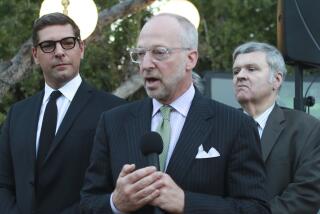Garcetti accused of conflict of interest in Clear Channel vote

- Share via
Los Angeles mayoral candidate Emanuel Pleitez lodged a complaint with the Ethics Commission this week alleging his opponent, Eric Garcetti, had a financial conflict of interest when he signed off on a lucrative deal with a billboard company.
Garcetti, a city councilman, voted in 2006 for a legal settlement that allowed Clear Channel Outdoor to convert hundreds of billboards to a digital format. At the same time, he held stock in Clear Channel Communications, the billboard company’s parent. On financial disclosure forms, he had checked a box valuing the stock at between $2,000 and $10,000.
Pleitez spokesman John Hill said Garcetti should have recused himself. “Councilmember Garcetti tries to portray himself as so ‘holier than thou,’ but the more you dig the more dirt you find,” he said.
Garcetti’s ownership of Clear Channel shares was first reported by the LA Weekly. After neighborhoods began complaining about the brightly lit Clear Channel signs, Garcetti said he wished he had voted differently.
Jeff Millman, Garcetti’s spokesman, said the billboard vote did not pose a conflict because Garcetti “didn’t know or have any reason to know” that he had a financial interest. In his disclosure forms, Garcetti described Clear Channel Communications, which owns radio stations in dozens of cities, as a radio company.
Garcetti also participated in a 2007 vote involving Home Depot, even though he had between $2,000 and $10,000 worth of stock in the hardware giant, according to city records. In that case, he voted against Home Depot’s interests, effectively rejecting a store planned in Sunland-Tujunga by demanding more environmental review.
Garcetti disposed of the Clear Channel and Home Depot shares in August 2007, giving them to charity. He did so one week after his Home Depot vote, according to disclosure forms.
Millman said the Home Depot vote was not an issue because the amount of revenue at stake did not reach the financial threshold that would have made it a conflict of interest under state law.
The Times reported last week that City Controller Wendy Greuel pushed for the council to block Home Depot’s project yet did not publicly discuss that she had inherited a 50% share in a potential competitor, a family building supply business nine miles away. A Greuel spokeswoman said last week that there was no conflict because other Home Depots were near her family’s business.
Under state law, regulators determine a conflict of interest after reviewing a variety of factors, including the size of the elected official’s investment and the amount of revenue generated by the vote. Experts contend the council’s vote on Clear Channel generated hundreds of millions of dollars for the company. That surpasses any threshold used by state regulators to establish a conflict of interest.
Gary Winuk, who handles enforcement for the state Fair Political Practices Commission, said his agency’s statute of limitations for conflict-of-interest cases runs out after five years.
Pleitez has been criticizing Garcetti for weeks and is going after voters in many of the same neighborhoods as the councilman. His spokesman said there was a good case to be made that Greuel made “an equally compromised decision” on Home Depot’s proposed store.
Nevertheless, Hill said, Pleitez has no immediate plan to file a complaint against Greuel.
More to Read
Sign up for Essential California
The most important California stories and recommendations in your inbox every morning.
You may occasionally receive promotional content from the Los Angeles Times.











